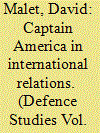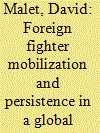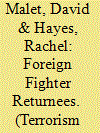| Srl | Item |
| 1 |
ID:
142258


|
|
|
|
|
| Summary/Abstract |
Biological weapons are typically associated with rogue states and terrorist groups; germ weapons used by weak actors against the strong. This article makes a contrary argument, that the emerging use of biotechnology by the United States, China, and other hegemonic powers is likely to afford them a new Revolution in Military Affairs (RMA), one at least as significant as the introduction of the information technology RMA that gave the United States a dominant edge over potential adversaries at the end of the Cold War. It examines recent developments and current R&D programs that call into question the rights of enemy combatants, civilian populations in target areas, and soldiers who will be physically augmented to pursue battlefield objectives. Examples include the Quikclot used to reduce fatalities in the Iraq War, which arguably prolonged public support for the war, and the Pentagon’s publicly detailed research across various programs to create super-soldiers akin to super-heroes. The real advances in biotech will likely only further retrench the major powers of the international system by conferring an asymmetric advantage far beyond the capacity of weaker actors to match.
|
|
|
|
|
|
|
|
|
|
|
|
|
|
|
|
| 2 |
ID:
083665


|
|
|
|
|
| Publication |
2008.
|
| Summary/Abstract |
The goal of Islamist terror groups is most usefully conceptualized as lowering levels of dynamic density within the international society to prevent Western institutions from supplanting local ones. Expressing the conflict in terms of relative influence permits a definition of the issue of contention that is currently lacking. This article draws on precepts of systems theory to explain the "War on Terror" as a conflict over the penetration of Western institutions into other societies. The basis of American grand strategy should therefore be encouraging greater reach of institutions that continue to enjoy global appeal despite policy differences.
|
|
|
|
|
|
|
|
|
|
|
|
|
|
|
|
| 3 |
ID:
139996


|
|
|
|
|
| Summary/Abstract |
Although foreign fighting is hardly new, scholarly research on the phenomenon is only a decade old. Since 2005, there has also been a dramatic rise in the number of transnational insurgents fighting in the Middle East, and they appear to have become the face of the jihad movement. However, of the dozens of foreign fighter contingents around the world in recent decades, only about half have been Islamists. In this article, I contend that the difference between the other contemporary and historical foreign fighter groups and the jihadis is not one of mobilization or effectiveness, but of persistence. Most other foreign fighters demobilized at the end of their conflicts and reintegrated. I argue that the primary factor that accounts for the persistence of the jihadis was the policies of their home and host states that prevented reintegration and created cohorts of stateless, and now professionalized, actors who perpetuate in weakly-governed conflict zones. In presenting this argument, I first attempt to establish a common working definition of foreign fighter based on the first decade of discourse in this emerging field of study, and present a comparative examination of the largest recorded foreign fighter mobilizations.
|
|
|
|
|
|
|
|
|
|
|
|
|
|
|
|
| 4 |
ID:
175739


|
|
|
|
|
| Summary/Abstract |
How long does it typically take a returned foreign fighter to launch a domestic terror attack? The issue of returnees, and appropriate national and international responses to potential threats, has become a preeminent security concern of the 2010s, impacting policies on everything from refugees to whether to permit ISIS fighters to leave the theater of conflict alive. This article attempts to illuminate these contentious debates through a new data set of Lags in Attack Times of Extremist Returnees (LATER) that examines 230 jihadi returnees to Western countries. The data indicate that the majority of attempted attacks occur within one year, with a median lag time of just four months. Prison appears to play no role in lag times. Our findings indicate that security and reintegration efforts should be targeted within the critical six months after return, which diminishes the risk of attack considerably.
|
|
|
|
|
|
|
|
|
|
|
|
|
|
|
|
| 5 |
ID:
093917


|
|
|
|
|
| Publication |
2010.
|
| Summary/Abstract |
Insurgencies that recruit foreign nationals to join rebel groups in various civil wars around the globe are a source of growing concern to policymakers. Despite attention focused on recent Islamist groups, foreign fighters are a phenomenon that is neither new nor uniquely Islamic. In conflicts from the Spanish Civil War to the Afghanistan War, insurgencies consistently recruited foreigners by framing the local war as one that threatened a shared transnational identity group and necessitated a defensive mobilization. It is therefore possible to draw lessons about combating their flow through counter-recruitment from a wide array of historical cases.
|
|
|
|
|
|
|
|
|
|
|
|
|
|
|
|